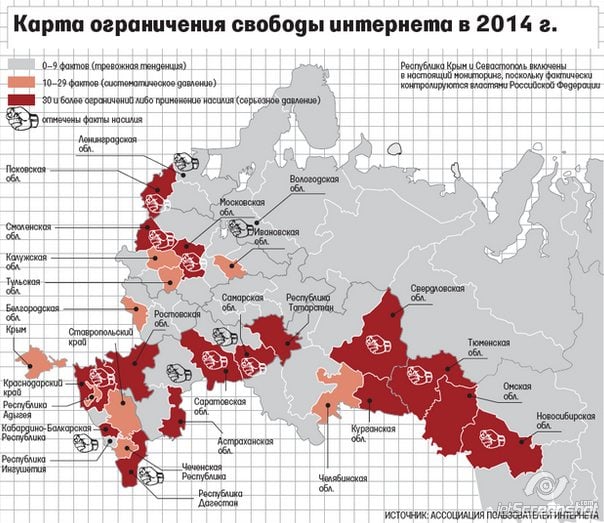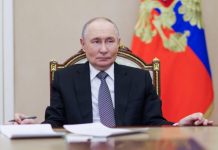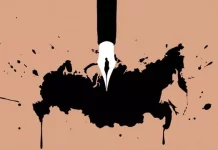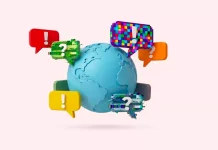
Доклад о свободе Интернета в 2014. Число ограничений свободы интернета выросло в 1,5 раза http://t.co/9PPhZfDTXI pic.twitter.com/ZFs2vHtMeo
— Pavel Chikov (@pchikov) February 4, 2015
Ассоциация пользователей интернета представила доклад «Свобода интернета 2014: Власти не оставляют интернету выбора» http://t.co/Q0OmanrwF8
— РосКомСвобода (@RuBlackListNET) February 4, 2015
Translation: Association of Internet Users presents a report, “Freedom of the Internet 2014. The authorities don’t leave the Internet a choice.
What’s striking about the map are the icons of fists in some regions which show where force was used — beatings of bloggers, for example, or raids of offices — in order to stop Internet freedom.
The co-founders of the group, lawyer Damir Gaynutdinov and Pavel Chikov, a lawyer and member of the Presidential Council for Human Rights, say the number of incidents of restriction of online freedom has increased by a factor of 1.5, from 1,832 to 2,951. But they also noted that criminal proescution for Internet activism has been nearly halved, from 226 cases in 2013 to 132 in 2014, since there are more cases now for “extremism.”
The authors of the report found a sharp increase in administrative pressure from Roskomnadzor, the state censor and the Prosecutor General’s Office, from 514 incidents to 1,448. These include a variety of problems, from complaints that the child filters were not working in schools to the threat to expel students in St. Petersburg for their social media use.
The war in Ukraine is the factor that led to the increase in incidents. A number of online publications were warned over interviews with leaders of the Ukrainian ultranationalist group Right Sector. Users were also prosecuted for supporting Crimean Tatars. A number of bloggers or journalists suffered beatings. For the first time, the government seemed to make its first serious efforts to issue warnings over preparation for mass actoins.
For the first time in Russian Internet issue, the growth in the number of users has stalled and the number of domains in the .ru zone have decreased.
Internet Live is still showing 10% Internet growth in Russia, but this is an estimate.
Moscow, St. Petersburg, Tatarstan, Kurganskaya and Tyumenskaya regions were the sites of most Internet restriction, say the authors. We note that in some cases these are also areas of high Internet usage and levels of freedom as well, so it stands to reason.
Leonid Levin, chairman of the State Duma Committee on Information Policy, disagrees with the findings. If sites are shut down for promoting or distributing drugs, that’s unrelated to freedom of speech. He also believes that the economic crisis has caused a reduction in Internet use and also “overcrowding” on the .ru domain, forcing users to migrate to other domain names.
Surveys of these types can be limited; in this case, areas where nothing seems to be happening seem to be “free” but they could just be “not connected” or suffering the after-effects of a crackdown. Chikov recognizes this built-in problem:
@kozlovsky а карту не надо воспринимать как иллюстрацию всего, что происходит. Она дополняет фактуру и привлекает внимание
— Pavel Chikov (@pchikov) February 4, 2015
@pchikov Я это понимаю. Просто IMHO в данном случае она плохо показывает тенденции. Отключат вообще рубильник – и карта станет идеальной.
— Олег Козловский (@kozlovsky) February 4, 2015
Translation: I understand that. It’s just that IMHO, in this case, it’s showing the trends poorly. If the switch is turned off completely, the map becomes ideal.
By Catherine A. Fitzpatrick, The Interpreter




